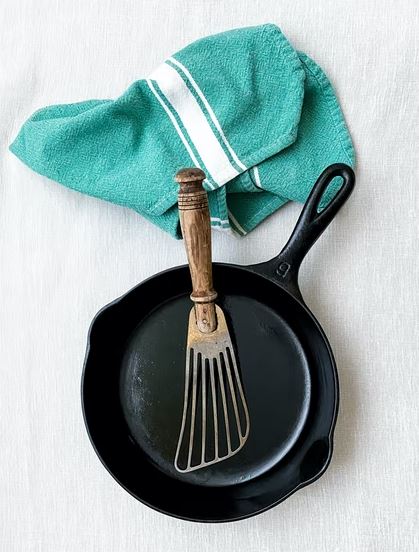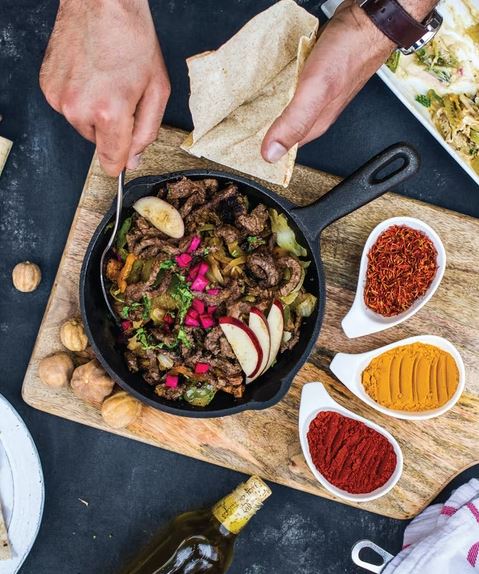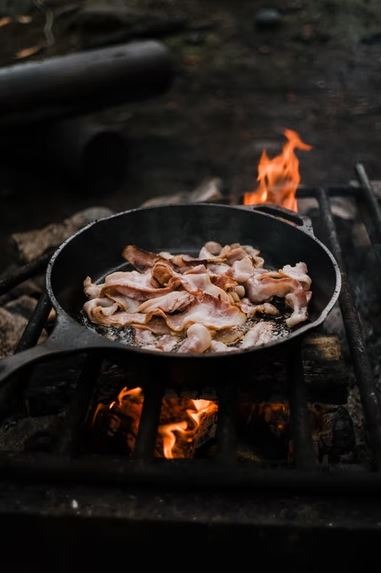Most of the cookware available on the market is usually made with nonstick. Although you can cook almost anything using nonstick cookware, the experience of using a cast iron skillet is something else.
When you buy a cast-iron skillet or any kind of cast-iron cookware and take proper care of it, it can last forever. Cast-iron cookware is naturally non-stick and rarely will food stick to the pan. However, there are many negative reviews for cast-iron cookware on the internet. The main reason is that people simply don’t know how to use it.
When used correctly and taken care of, cast iron cookware is something that can last you a long time and make your cooking better than ever before.
Some tips for using a Cast Iron
If you want to use your cast iron to the fullest, you must know the correct way to handle it. Here are some tips for using cast iron cookware.
Do not choose the cheap pan
When you set out to buy a piece of cast iron cookware, do not pick the cheapest one. Whenever you buy cookware, you are probably going to use it every few days, if not every day. You also want it to last for years and years. Therefore, you should always choose good quality cookware over cheap ones.
Similarly, when you set out to buy cast iron cookware, choose one that is of better quality. There are many options in the market that you can choose from.
Additionally, choose a lightweight pan if you plan on using it every day. If you choose a heavier pan, it may not be comfortable to pick up and move. Thus you may be put off by it and not use it. In addition, buy one that has a smooth interior to maximize the nonstick qualities.
Use a lot of healthy fats
You should always start with a cast iron pan, as it is the best way to use it. Then, whenever you cook using the pan, always use an ample amount of fat. You want to maintain the nonstick nature of the cast iron pan. Therefore, you should aim to keep it well lubricated.
The best way to do it is to use butter, lard, coconut oil, olive oil, and ghee. All these are healthy fats that can help add moisture to your food and also keep your skillet’s surface nonstick.
Always preheat your cast Iron
Many people believe that cast iron is great at conducting heat. However, that is not the case. Cookware made of cast iron is good at retaining heat once it gets hot, but it does not conduct heat very well. Therefore, it is not good to put your food on your cast-iron cookware as soon as you place it on the stove.
When you first put your skillet on the stove, it will heat up unevenly. Therefore, if there is any food on there, it may burn or get cooked unevenly.
To avoid burning your food or having it half raw, preheat your cast iron, so that the food cooks through at the same rate. The best way to preheat it is to set it on the stove on low heat for at least five minutes before you start cooking it. This way heat spreads evenly, and you can cook your food to perfection afterward.
Use stainless steel, wood, or bamboo utensils
Having the correct utensils to go alongside your cookware is also extremely important. If you use a plastic spoon with your cast iron skillet, it will eventually start to melt or burn.
Cast iron cookware can get very hot, and plastic spoons can leach chemicals. Therefore, if you use them, there is a chase that those chemicals can contaminate your food. What is worse is that you would never know.
Thus, you should use stainless steel or wood utensils with your cast iron. Not only are they easy to find, but they will also last you a long time. You can also use bamboo utensils. Such materials are not only good utensil materials, but they also reduce waste.
Stainless steel utensils are perfect for cast iron cookwares because there is no nonstick coating to maintain. Thus, you can be as rough with your spatula and not worry about the coating rubbing off or the bottom of the pan getting scratched up.
Do not wash the cast iron with soap
We live in a world that is obsessed with cleanliness and keeping everything squeaky clean by using soaps and other cleaning products. However, using a bar of soap to clean your cast iron cookware is the last thing you should do.
To clean a cast iron skillet, it only needs to be be rinsed or wiped clean. It may be tempting to use soap to remove the remains of the food you have cooked, but it is inadvisable to use it. If you use soap, you will erase all the hard work that you put into seasoning the pan.
The best way to use cast iron is to not even rinse them. Simply cook on it, and then after it has cooled, keep it away for next that. That way, you can build up the seasoning on the pan.
Scrap the remains
Since cleaning the pan using dish soap is a big no with cast iron, you may wonder how to remove something that has gotten stuck on the pan. The answer is to simply scrape it off.
Since there is no nonstick layer on the cast iron, you do not have to worry about scratching the bottom. Thus, you can use a plastic scraper to scrape the food off.
If it is tough and does not come off with a scraper, simply fill it up with water and leave it for a little while. Be sure to fill it up just enough to cover the stuck food. The food should come off easily with this method if you have seasoned your pan well.
Dry the pans well
Moisture is the biggest enemy of cast iron because if left wet, your cast iron cookware can cause rust. Whenever your pan gets wet, make sure that you are drying it fully. You can use a towel to do so, but there are better ways.
The best way to dry your cast-iron cookware is to place it on the stove at low heat. When you do so, all the moisture will evaporate from the outside, inside, and even from the handles. This method is by far the most effective one as it ensures that the pan is completely dry. Additionally, it also saves you tissues and your kitchen towels as they can get dirty from the cast iron.
Always leave a little oil in the pan
You should never let your cast iron cookware get dry. It is always best to have a little oil leftover on the pan. This oil can help prevent rust and improve the non-stick properties of the pan. Oil is slippery and thus prevents foods from sticking to the cookware.
To ensure that your pan always has a bit of oil, you have to intentionally put it there. Once you have cleaned and dried your pan, coat the inside of it with some healthy fats. For coating, you can use either coconut oil or ghee. Bacon grease can work too.
Ensure that the coating is light as a little fat can go a long way.
Season the cast iron
Seasoning is how cast iron skillets get their nonstick, smooth surface. If you want to prevent any food from sticking to your cast iron cookware, you should make sure that you season it every couple of months. However, if you use your cast iron rarely, then seasoning the pan once a year will work too.
Here is how you can season your cast iron pan.
- The first step is to clean your pan thoroughly. Use mild dish soap to remove any rust, food particle, or dust that may have gotten stuck to the pan. Scrub the pan thoroughly. Even the handles need to be cleaned.
- Next, dry the pan. You can use dish towels or place the pan on the stove and turn the burner to a low flame.
- Then, rub some canola oil on all areas of the pan that is made of cast iron. Some pans have an enamel bottom and handle. If that is the case then do not oil those parts.
- Once oiled, take a clean cloth and wipe away any excess oil. The cast iron has pores that absorb all the oil it needs. Any leftover oil needs to be removed.
- Next, turn on your oven, set it to the highest temperature, and place the pan upside down in it. Then leave the pan for an hour.
- When time is up, remove the pan and let the cast iron pan stay in the oven until is cool to the touch.
Your pan is now seasoned and ready for you to cook delicious meals on it.
Conclusion
Many different brands offer different cookware in different materials. For example, Magnalite cookware is known for its aluminum cookware, but the flavor cast iron pans can give your food is hard to replicate on cookware of any other material.
Cast iron pans are often thought to be for professionals, but the truth is, you can use them if you know how to maintain them and use them. With just a few tips, you can master the cast iron pan and make delicious foods using it.



